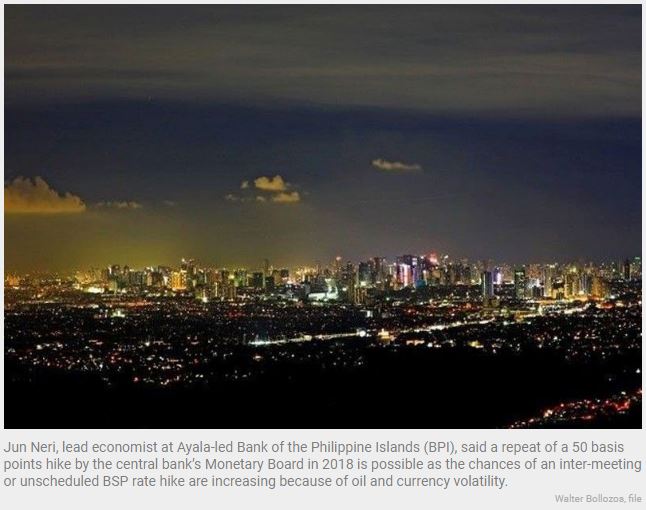Philippines: As inflation quickens, economists now expect aggressive rate hikes
MANILA, Philippines — Economists believe the Bangko Sentral ng Pilipinas (BSP) could deliver aggressive rate hikes amid quickening inflation, as well as the continued interest rate liftoff by the US Federal Reserve.
Jun Neri, lead economist at Ayala-led Bank of the Philippine Islands (BPI), said a repeat of a 50 basis points hike by the central bank’s Monetary Board in 2018 is possible as the chances of an inter-meeting or unscheduled BSP rate hike are increasing because of oil and currency volatility.
“Kicking the can further may eventually lead to a situation that could force the BSP to hike by more than 25 bps in one meeting, similar to what happened in 2018,” Neri said.
Inflation quickened to 4.9 percent in April, its highest level for more than three years, from four percent in March and averaged 3.7 percent in the first four months of the year.
“Inflationary pressures will likely worsen if the BSP doesn’t hike its policy rate soon,” Neri said.
Neri added that the US Fed raised its policy rates anew by 50 basis points and may hike again by the same magnitude in the next two meetings.
“Without any rate hikes from the BSP, the interest rate differential between the Philippines and the US will be close to zero and will turn negative in 2023. A situation like this will likely result to a substantial depreciation of the peso and may de-anchor inflation expectations further,” Neri said.
The 170-year-old bank sees the BSP Monetary Board raising rates by 75 basis points to 2.75 percent this year from the current all-time low of two percent.
“Even with this magnitude of increase, the policy rate will still be below historical levels and it may not have a substantial impact on growth and employment. Furthermore, the impact of rate hikes is usually gradual and the economy has the capacity to absorb slightly higher interest rates, especially now that demand is almost back to pre-pandemic level,” Neri said.
According to Neri, hiking the policy rate would serve as a stabilizing tool that could temper the depreciation of the peso and would likely prevent a substantial decline in the country’s gross international reserves (GIR) that could lead to more volatility in the local markets.
Although an aggressive rate hike by the BSP is possible, ING Bank Manila senior economist Nicholas Mapa said monetary authorities are likely to opt for a gradual tightening.
After slashing interest rates by 200 basis points and lowering the reserve requirement ratio (RRR) in 2020 as part of its COVID-19 response measures, the BSP has opted to maintain an accommodative policy stance by keeping rates at record lows since November 2020 to allow economic recovery gain more traction.
“Possible. But given the stark reluctance from monetary authorities to hike rates, we believe that BSP will adopt a very measured approach to normalizing policy rates. A 25 basis points rate increases would more likely be the weapon of choice,” Mapa said.
Security Bank chief economist Robert Dan Roces said inflation causes remain cost-push driven and there is only so much that monetary policy can do, so the BSP may take a gradual step towards policy normalization.
“There is a higher chance, but the base view remains at 25 basis points as initial,” Roces replied when asked if an aggressive 50 basis points hike by the central bank is possible.
Roces explained the BSP may assess the size versus the gross domestic product (GDP) growth report, unemployment rate, and the trajectory of inflation this month.
Michael Ricafort, chief economist at Rizal Commercial Banking Corp., said more aggressive rate increases by the US Fed and other central banks to better rein in inflation would be a consideration on a possible hike in local policy rates by the BSP as early as June this year.
“It is a tough and delicate balancing act in managing the monetary policy, going forward, to prevent inflation from spiraling further, while at the same time, helping sustain the fragile economic recovery prospects still reeling from the adverse effects of the pandemic,” Ricafort said.
Ricafort warned that any premature tightening of monetary policy may not be necessarily effective in curbing supply-side inflationary pressures, especially those that are external in nature and beyond the country’s reasonable control, thereby jeopardizing economic recovery.
For his part, BSP Governor Benjamin Diokno said the central bank’s Monetary Board would review its assessment of the inflation outlook and macroeconomic prospects with the release of the first quarter GDP growth outturn, along with evidence of possible second round effects and developments in inflation expectations during its meeting on May 19.
“Latest assessment also indicates that domestic economic activity has gained stronger traction with the easing of remaining mobility restrictions. However, heightened geopolitical tensions and a resurgence in COVID-19 infections in some countries have also clouded the outlook for global economic growth,” Diokno said.
The BSP chief said earlier that the tightening cycle could commence as early as June this year.
Source: https://www.philstar.com/business/2022/05/06/2178995/inflation-quickens-economists-now-expect-aggressive-rate-hikes


 Thailand
Thailand




